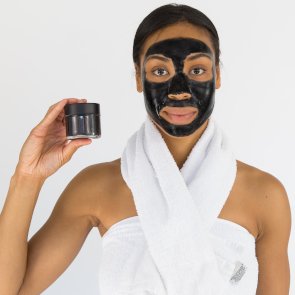5 Types of Face Masks and Their Benefits
 There’s a face mask for every skin type and concern, from dehydration to acne to premature aging. Some masks give the skin an immediate boost when you need to make yourself look presentable right now (for example, SOS masks that moisturize the skin in just 15 minutes), while others are designed for prolonged care (for instance, nighttime moisturizing masks for dehydrated skin). Here are 5 popular types of face masks that you should consider including in your skincare routine.
There’s a face mask for every skin type and concern, from dehydration to acne to premature aging. Some masks give the skin an immediate boost when you need to make yourself look presentable right now (for example, SOS masks that moisturize the skin in just 15 minutes), while others are designed for prolonged care (for instance, nighttime moisturizing masks for dehydrated skin). Here are 5 popular types of face masks that you should consider including in your skincare routine.Clay Masks
Active ingredients: kaolin, bentonite, montmorillonite, illite, Moroccan lava clay (ghassoul/rhassoul), solum fullonum (fuller’s earth/multani mitti), magnesium silicate, aluminum silicate.
Clay is an excellent absorbent. It absorbs excess oil (sebum) from the skin surface and sucks it out of pores. Clay masks are perfect for oily and combination skin that tends to get shiny and suffers from clogged pores, blackheads and pimples. However, if you have dry or dehydrated skin, you don’t need them. Try to avoid clay masks that contain ethanol and other simple alcohols, menthol, eucalyptus oil, peppermint oil, menthol or artificial fragrance; such masks may irritate the skin.
Check this out: 5 Types of Cosmetic Clay and Their Skin Benefits
Moisturizing and Nourishing Masks
Active ingredients: shea butter, cocoa butter, avocado oil (or other carrier oils), glycerin, squalane, hyaluronic acid, ceramides.
All skin types need moisture and nutrients. You absolutely need moisturizing and nourishing masks if your skin is naturally dry (i.e. produces less sebum than normal skin) or if you’ve noticed dry or flaky patches on your face. Rinse-off and sheet masks are designed for instant hydration, whereas the so-called sleeping (overnight) masks take care of your dehydrated skin while you sleep.
Check this out: 5 Super Nourishing Face Masks with Shea Butter
Skin Lightening / Whitening / Brightening Masks
Active ingredients: arbutin (bearberry extract), vitamin C (ascorbic acid), niacinamide, alpha and beta hydroxy acids, retinoids, kojic acid.
Skin lightening masks are designed for people who suffer from a dull complexion and pigmentation. They improve skin tone and restore the skin’s healthy glow. Please avoid skin whitening productes that contain hydroquinone because this lightening agent is associated with safety concerns. It has been banned in over-the-counter preparation in the EU.
Check this out: 5 Effective Ingredients for Skin Whitening
Exfoliating Masks
Active ingredients: fruit enzumes (papain from papaya or bromelain from pineapple) and acids (lactic acid, salicylic acid, glycolic acid, mandelic acid).
Exfoliating masks can remove dead cells, stimulate the renewal of the outer layer of the skin and reduce the appearance of pores. They are suitable for all skin types because every skin type needs regular exfoliation. However, you should be careful with all skincare products that contain acids because they can cause skin irritation and other topical reactions.
Check this out: Pros and Cons of Using Salicylic Acid for Acne-Prone Skin
Antioxidant Masks
Active ingredients: vitamin C (ascorbic acid), vitamin A (retinol), vitamin E (tocopherol), vitamin B3 (niacinamide), coenzyme Q10, pomegranate extract, green tea extract, lycopene, caffeine, ferulic acid, resveratrol, curcumin.
Antioxidants protect the skin from free radicals (unstable molecules that are responsible for premature aging). Face masks with antioxidants have multiple skin benefits: they slow down the aging process, protect the skin from the environment (including UV damage when used along with sunscreen), and give a healthy and glowing complexion.
Check this out: 5 Benefits of Antioxidants for Your Skin
Breadcrumbs
Filters
- Face
Tags
Related Articles
- 5 DIY Face Masks for Dull Skin, 5 DIY Face Masks for Oily Skin, 5 DIY Face Masks for Dry Skin, 5 DIY Face Masks for Clear Skin